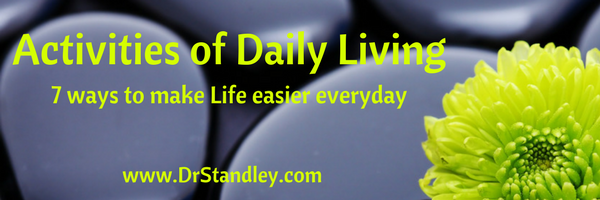|
|
 |
|||||||||

Activities of Daily Living (ADLs) is a real term used in healthcare that refers to daily basic self-care activities in an individual's residence, outdoor environment or both. The ability or inability that an individual performs their ADLs is a measure of the functional status of the individual, particularly the injured, those with disabilities and the elderly. Very young children require assistance from adults to perform ADLs since they have not yet developed the skills necessary to perform ADLs on their own. Basic ADLs (bADLs) are the things we normally do such as bathing, dressing, feeding ourselves, functional mobility, personal hygiene and grooming. Instrumental ADLs (iADLs) are things such as housework, money management, preparing meals, shopping and work. Sometimes it is necessary to review the rules of kindergarten to remember how to be nice to others and use Good manners. And sometimes we just need to go back to the basics of the 'Activities of Daily Living' in order to take better care of ourselves and start living Life rightly. Below you will see 7 simple activities to accomplish at some point during the day all under the motivation of the the daily mentation question below. You have 24 hours to get through this question along with the 7 activities. READY? SET? GO! When I am faced with a once in a Lifetime opportunity, do I take it or do I think about what it would be like to take it?

Choose two (2) of the 'Vitamin B2' foods below DESCRIPTION: This vitamin is a water and alcohol soluble micronutrient. Vitamin B2 aids in the metabolism of carbohydrates, fats and proteins. It is unstable in light and not destroyed by heat in cooking unless with alkali. POTENTIAL BENEFITS: It is important in the formation of certain enzymes and natural growth and reproduction. It also participates in our adaptation to light. Helps support vision and cellular respiration. Promotes energy production and healthy red blood cell formation. It also aids in the maintenance of healthy skin, nails and hair growth. It may be helpful in stressful situations. FOOD SOURCES: Alfalfa sprouts, almonds, apples, apricots, asparagus, avocado, banana, beans, bee pollen, brewer's yeast, broccoli, brussel sprouts, cashews, cheese, cherries, chicken, currants, dates, eggs, figs, fish, garlic, grains, green vegetables, kelp, liver, meat, milk, nutritional yeast, nuts, onion, organ meats, parsley, poultry, prunes, rose hips, seeds, spinach, spirulina, sprouts of kinds, watercress, wheat germ, wheatgrass, wild rice, and yogurt.
DISCLAIMER **This web site's goal is to provide you with information that may be useful in attaining optimal health. Nothing in it is meant as a prescription or as medical advice. You should check with your physician before implementing any changes in your exercise or lifestyle habits, especially if you have physical problems or are taking medications of any kind. |






















